Constituent Assembly of India Debates
Constituent Assembly of India Debates
Constituent Assembly of India Debates
You also want an ePaper? Increase the reach of your titles
YUMPU automatically turns print PDFs into web optimized ePapers that Google loves.
the Dominion can make laws in respect <strong>of</strong> the subjects on which they have acceded, a<br />
state <strong>of</strong> things which did not exist before the 15th <strong>of</strong> August. They have, most <strong>of</strong><br />
them, I believe, sent representatives to the <strong>Constituent</strong> <strong>Assembly</strong> and this <strong>Constituent</strong><br />
<strong>Assembly</strong> is going to function also as the Legislature <strong>of</strong> our Dominion, so that the<br />
political and the constitutional connection that exists today between the States and<br />
the Centre is much. closer than it ever was during the last 150 years. I only say<br />
political and constitutional connection. I do not refer to the effectiveness <strong>of</strong> the control<br />
that was exercised over <strong>India</strong>n States in the past. That may have been perhaps a little<br />
more efficient than may be possible under the existing state <strong>of</strong> things, but what I wish<br />
to draw particular attention to is that we have erected an organic political and<br />
constitutional structure which has commenced to function from the 15th <strong>of</strong> August.<br />
The credit for this, I think, should primarily go to the great awakening <strong>of</strong> public<br />
opinion in the States. It--should next go, I think, to the well considered policy <strong>of</strong><br />
inviting the accession <strong>of</strong> <strong>India</strong>n-States to the Dominion which was announced by<br />
Sardar Vallabhbhai Patel who presides over the States Department today. But above<br />
all I should say that the actual accession <strong>of</strong> practically the overwhelming bulk <strong>of</strong> <strong>India</strong>n<br />
States, the credit for that should go to the statesmanship and the genius for what hehimself<br />
has called open diplomacy with which Lord Mount batten has roped them in. I<br />
say this advisedly, because I think that but for the energy and the consummate skill<br />
which he has employed in this matter, we might not have reached the result which we<br />
are so happy to see today.<br />
Now, Sir, I was mentioning this in order to point out that there are some rather<br />
hazy opinions as to what this accession means. It is said that the States have acceded<br />
only on three subjects. It is true the are three subjects, described in. very broad terms<br />
but the actual Instrument <strong>of</strong> Accession which they have signed has detailed the items<br />
which come under each <strong>of</strong> these three heads and you will find that they really come to<br />
somewhere about 18 or 20. If we cut them up as in the list attached to the Union<br />
Powers Committee's Report, the number will probably be larger. The reason why I<br />
point out this particular fact is that representatives <strong>of</strong> States who are in this House are<br />
very subtantially interested in the business which has got to be transacted here<br />
whether it is by way <strong>of</strong> constitution making or it is by way <strong>of</strong> legislation or control over<br />
central administration. They are vitally interested in this matter and I should like all <strong>of</strong><br />
them to feel that there is absolutely no distinction between them and other<br />
representatives <strong>of</strong> <strong>India</strong> who are in this House. Now, Sir, having said that, I should<br />
finally refer to these three lists themselves the first question I dare say which will<br />
exercise the minds <strong>of</strong> many Honourable Members here would be whether after all, this<br />
kind <strong>of</strong> distinction as regards the lodgement <strong>of</strong> the residuary powers should continue.<br />
There, are two ways <strong>of</strong> removing that distinction. One is perhaps to go back to the<br />
Cabinet Mission Plan in view <strong>of</strong> the fact that we have exhaustively described the<br />
subjects in the three lists--and lodge the residuary powers in the case <strong>of</strong> the Provinces<br />
also in those Provinces. The second proposition is one which the States might<br />
consider. Very eminent statesmen connected with the administration <strong>of</strong> <strong>India</strong>n States<br />
have contended that what they wanted was a strong Centre and that if the Centre was<br />
made strong their hesitations about coming into the <strong>Constituent</strong> <strong>Assembly</strong> and<br />
participating in its labour would disappear. Well, if that view is concurred in by their<br />
colleagues here as also by the peoples' representatives from the <strong>India</strong>n States, it is<br />
quite up to them to consider the alternative <strong>of</strong> modifying the report <strong>of</strong> this Committee<br />
and agreeing to the lodgement <strong>of</strong> residuary powers in the Centre itself. Well, Sir, that<br />
will be one <strong>of</strong> the things which this House will have very seriously to consider. The<br />
report <strong>of</strong> the Committee is, I must emphasize however in favour <strong>of</strong> residuary powers<br />
being with the States in the case <strong>of</strong> the States and with the Centre in the case <strong>of</strong> the


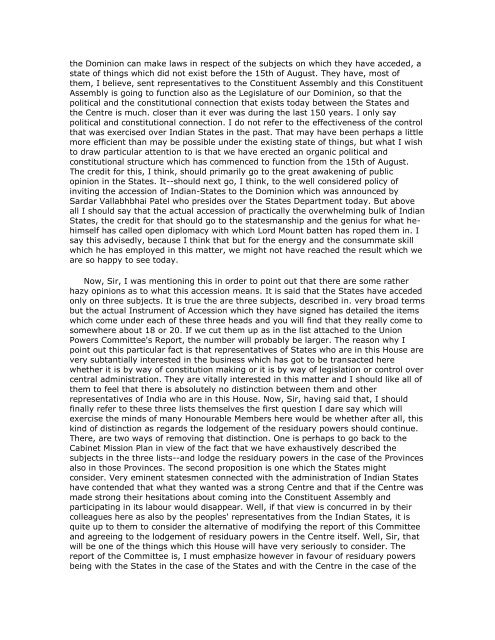
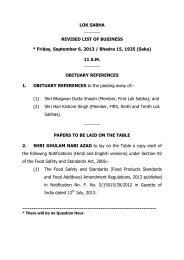
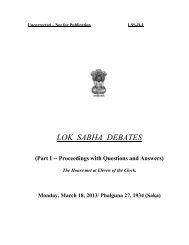
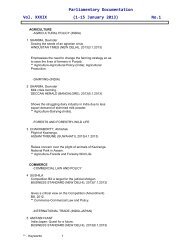
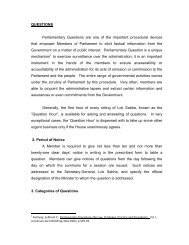
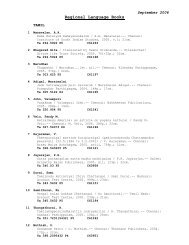
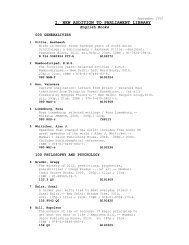
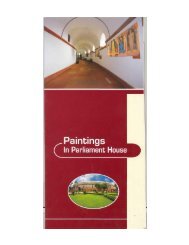
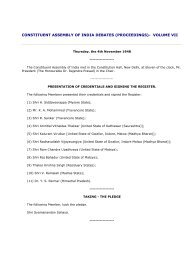
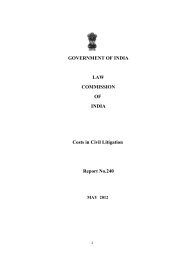
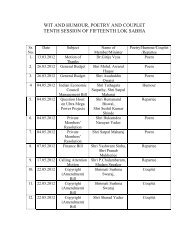
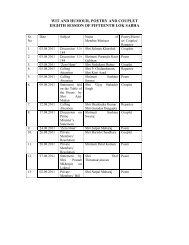

![gÉÉŌ A.]ÉŌ. xÉÉxÉÉ](https://img.yumpu.com/8015720/1/190x245/geeo-aeo-xeexee.jpg?quality=85)
